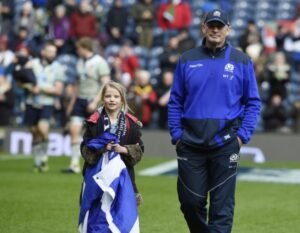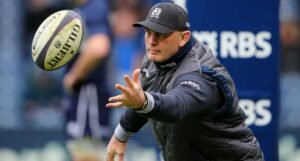Vern Cotter, a former New Zealand rugby union player, is a renowned coach in the sport. He has an extensive coaching career, which includes being the head coach of the Fiji national team in his most recent role. Prior to that, Cotter was involved with the coaching staff of the highly successful Crusaders team from 2005 to 2006. He then took on a coaching position in France with Clermont Auvergne, where he remained from 2006 to 2014.
Bio/Wiki
Age-61years
Height- 1.93 m
Weight- 115 kg
Born- 27 January 1962
Birthplace- New Zealand
Full name- Vernon Anthony Cotter
Profession-Coach
Nationality- New Zealand
Teams coached- Fiji national rugby union team (Head coach, since 2020), MORE
Family
Vern Cotter is a New Zealand rugby union coach, and information about his parents is not widely available in the public domain. Personal details about public figures, such as their parents’ names or backgrounds, can often be challenging to find unless they have been explicitly shared by the individual or mentioned in interviews or biographies.

Wife
During a break in the club season coinciding with the Six Nations, Emily, along with her children Holly (6), Thomas (4), and Arabella (almost 2), have returned to their residence in Te Puke. They have been enjoying their time for the past two weeks, leisurely basking in the sunshine and sandy shores of the nearby Papamoa beach.
Career
Playing Career
After a decade of representing Counties Manukau in New Zealand, Vern Cotter went on to play for several clubs in France.
Coaching Career
In 1999, Cotter returned to New Zealand and became the head coach of Bay of Plenty in the National Provincial Championship. In his first year, he led the team to victory in the Second Division championship of the North Island. However, they did not progress in the following years from 2001 to 2004.
During the 2004 Super 12 season, Cotter served as the forwards coach of the Crusaders, who finished as runners-up. He continued in that role in 2005 when the Crusaders won the competition, and they retained their title in 2006.

Clermont
Top 14
In 2006, Cotter became the Head Coach of ASM Clermont Auvergne for the 2006–07 Top 14 season. In his first year, Clermont finished as runners-up in the competition. The following season, they topped the table after the regular season with 20 wins out of 26 matches but finished second overall, losing in the Grand Final to Toulouse. In the 2009–10 season, Clermont won their first Top 14 title under Cotter’s leadership. They reached the semi-finals in the following three seasons but were knocked out. In his final season, Clermont were eliminated in the quarter-finals, which was their first home loss in 77 matches.
Heineken Cup
Under Cotter’s guidance, Clermont entered the Heineken Cup in his first year as head coach and made it to the knock-out stages. However, they were unable to advance out of the group stages in the following years. In the 2012-13 season, Clermont reached the Heineken Cup Final but lost to Toulon. They made it to the quarter-finals in the 2013–14 season but suffered a heavy defeat to Saracens in the semi-finals.
Scotland
Cotter left Clermont in May 2014 to become the head coach of the Scotland national team. In his first year, Scotland embarked on a successful tour, winning four consecutive matches in different continents. They defeated the United States, Canada, Argentina, but suffered a heavy loss to South Africa. In subsequent matches, Scotland achieved notable victories against Argentina and Tonga but finished last in the 2015 Six Nations Championship. However, they performed well in the 2015 Rugby World Cup, reaching the quarterfinals.
During the 2016 Six Nations Championship, Scotland secured victories over France and Italy but finished fourth overall. Cotter’s tenure with Scotland ended in June 2017 after leading the team to their most successful Six Nations campaign, despite finishing fourth in the table. He left with a 53%-win rate, making him the most successful coach of the professional era at that time.
In January 2020, Cotter took on the role of coach for the Fijian national rugby team.
Achievements/Club Honors
He coached the Scotland national team from 2014, including at the 2015 Rugby World Cup, and left his role in May 2017 as his contract was not extended by the Scottish Rugby Union. In January 2020 Cotter was appointed coach of Fiji,but resigned in January 2023.
Clermont, a team in the Top 14, emerged as winners in the 2009-10 season. They were also runners-up in the 2006-07, 2007-08, and 2008-09 seasons. In the Heineken Cup, they reached the finals in the 2012-13 season. They secured victory in the European Challenge Cup in the 2006-07 season. The Crusaders, competing in Super Rugby, claimed victory in 2005 and 2006 and were runners-up in 2004.
Net Worth 2023
Vern Cotter’s estimated net worth or net income ranges from $1 million to $5 million dollars.

Latest News About Vern Cotter
Recently Appointed Head Coach Of The Blues
Vern Cotter, the newly appointed head coach of the Blues, will commence his two-year tenure equipped with extensive knowledge gained from coaching abroad since 2006. This collection of experience highlights his impressive accomplishments as a professional coach in France, Scotland, and Fiji. However, the primary concern for everyone in the Blues region is whether Cotter can lead the team to a championship.
When questioned about this matter on Monday, Cotter provided a concise response. He emphasized ambition, attitude, and the desire to be the best. Cotter stated, “We come together, we are competitors, and we want to win titles. And this is what this group is about. It’s two years to win a title. There will be no excuses, we will be straight into it.”

While the Blues secured the Super Rugby trans-Tasman crown in 2021, they have not claimed a title in the complete competition since 2003. Cotter’s arrival coincides with the departure of Scott Robertson from the Crusaders, the team Robertson transformed into an unstoppable force, as he assumes the role of All Blacks coach next year. Consequently, the Crusaders will undergo a period of transition under their replacement, Rob Penney.
If Cotter can unravel the puzzle of molding the Blues into a successful team, the glory days may return to Eden Park. The Blues have also managed to retain over 90% of their players for the upcoming year, and Cotter has enlisted the assistance of Jason O’Halloran, who previously worked with him during his time with Scotland, to oversee the team’s attack. Assistant coaches Paul Tito, Craig McGrath, and Daniel Halangahu will be retained, while discussions regarding the future roles of Tom Coventry and Tana Umaga are still ongoing.
Cotter expresses eagerness to work with the forwards, indicating his desire for them to exhibit a more combative nature. Perhaps the memory of their feeble performance in the semifinals last month, when the Crusaders’ forwards dominated them in the contact area, leading to a resounding 52-15 defeat in Christchurch, remains fresh in his mind. Cotter states, “Yeah, I want to get the forwards. I want to get them a bit rougher and tougher. I believe rugby starts up front; we just need to focus on that. Everyone does, but we really need to prioritize it. We don’t necessarily need exceptional talent in the forward pack. We have an abundance of that in the backline. Of course, development will occur, but in simple terms, that is what we will be concentrating on.”
At 61 years old, Cotter will be the most experienced coach among the five New Zealand teams. His intolerance for incompetence, coupled with a tough-minded attitude, brought him success during his tenure with Bay of Plenty in the early 2000s. When the Bay achieved victory in the Ranfurly Shield, it propelled Cotter and his coaching colleague Joe Schmidt into the spotlight. Subsequently, when Cotter joined Clermont, he invited Schmidt to accompany him.